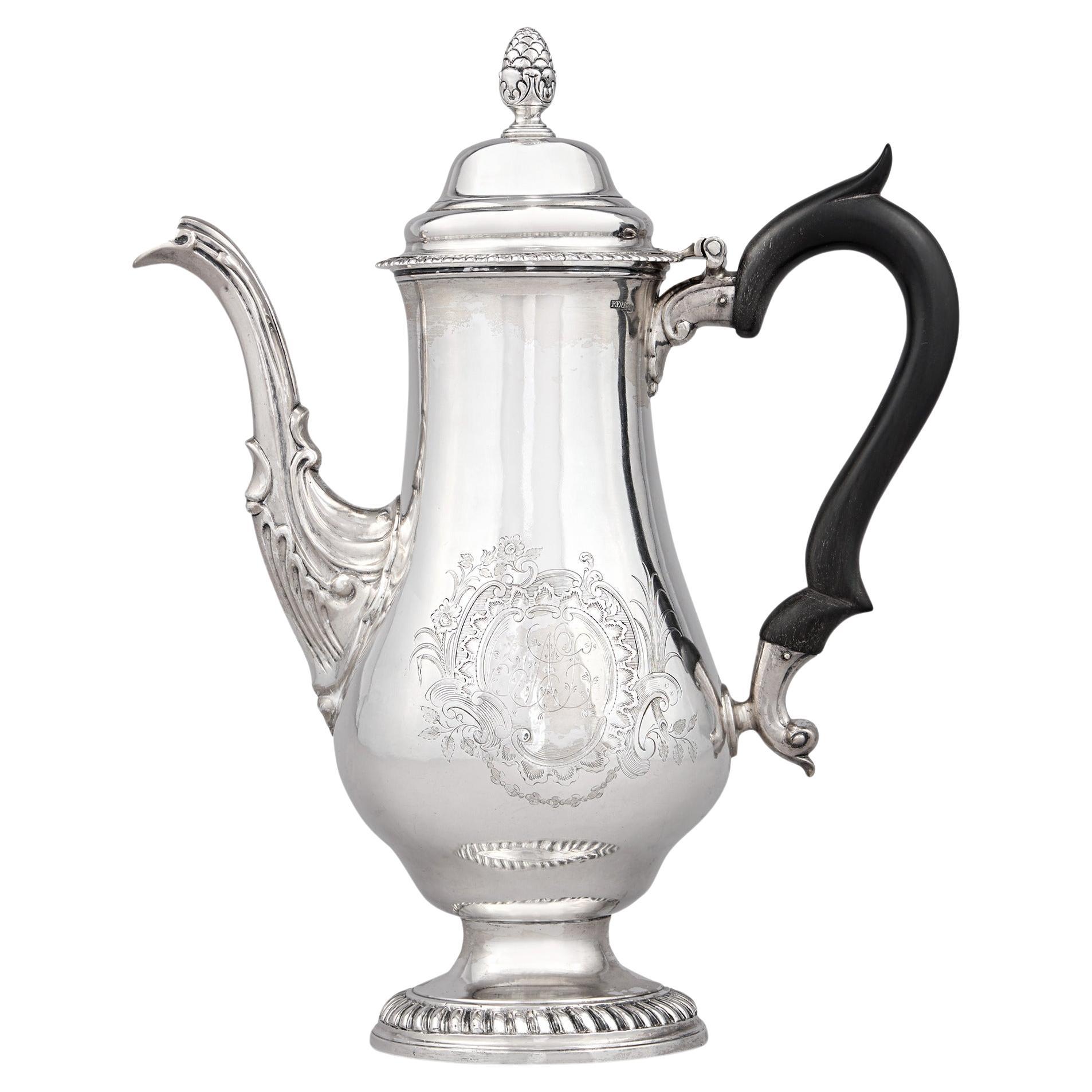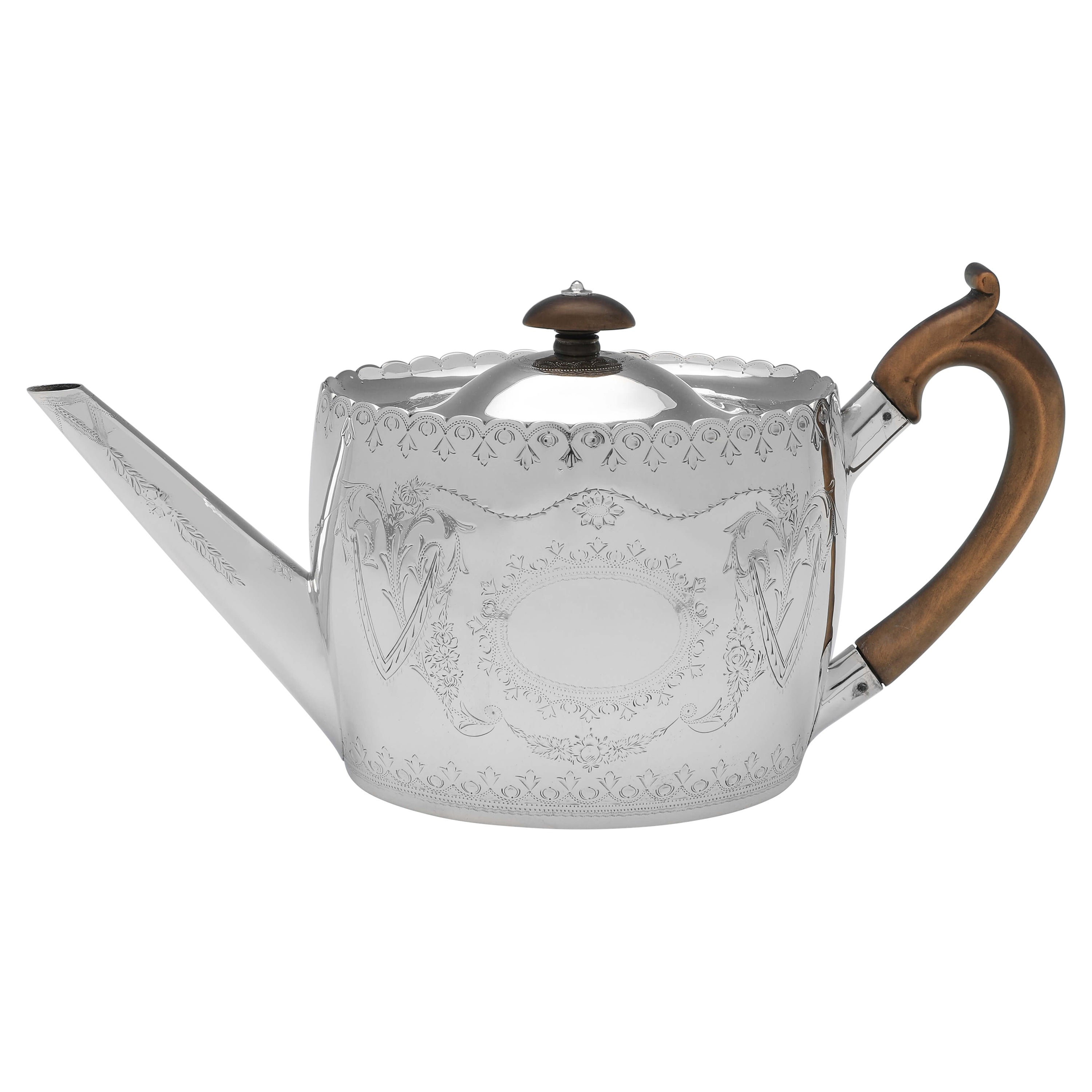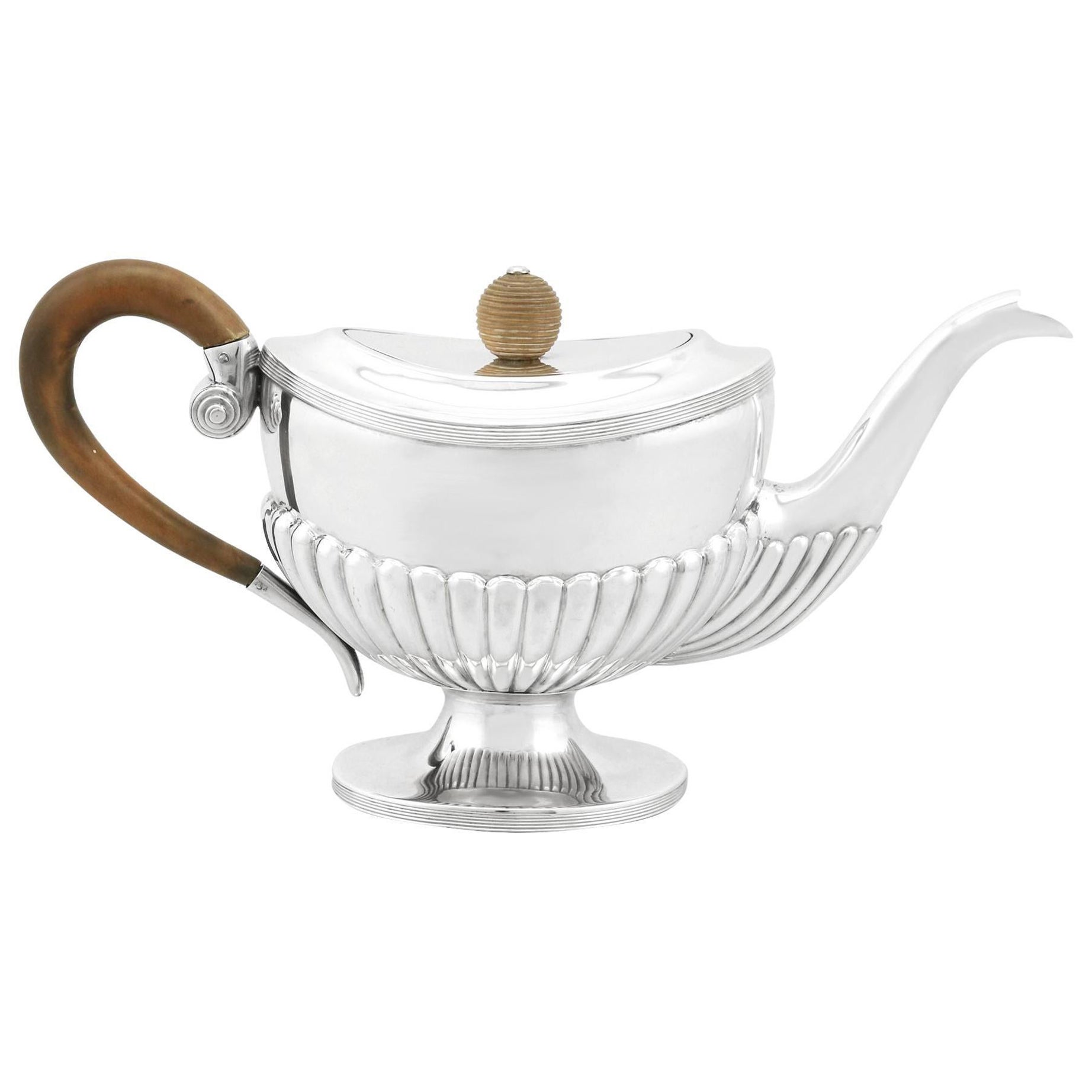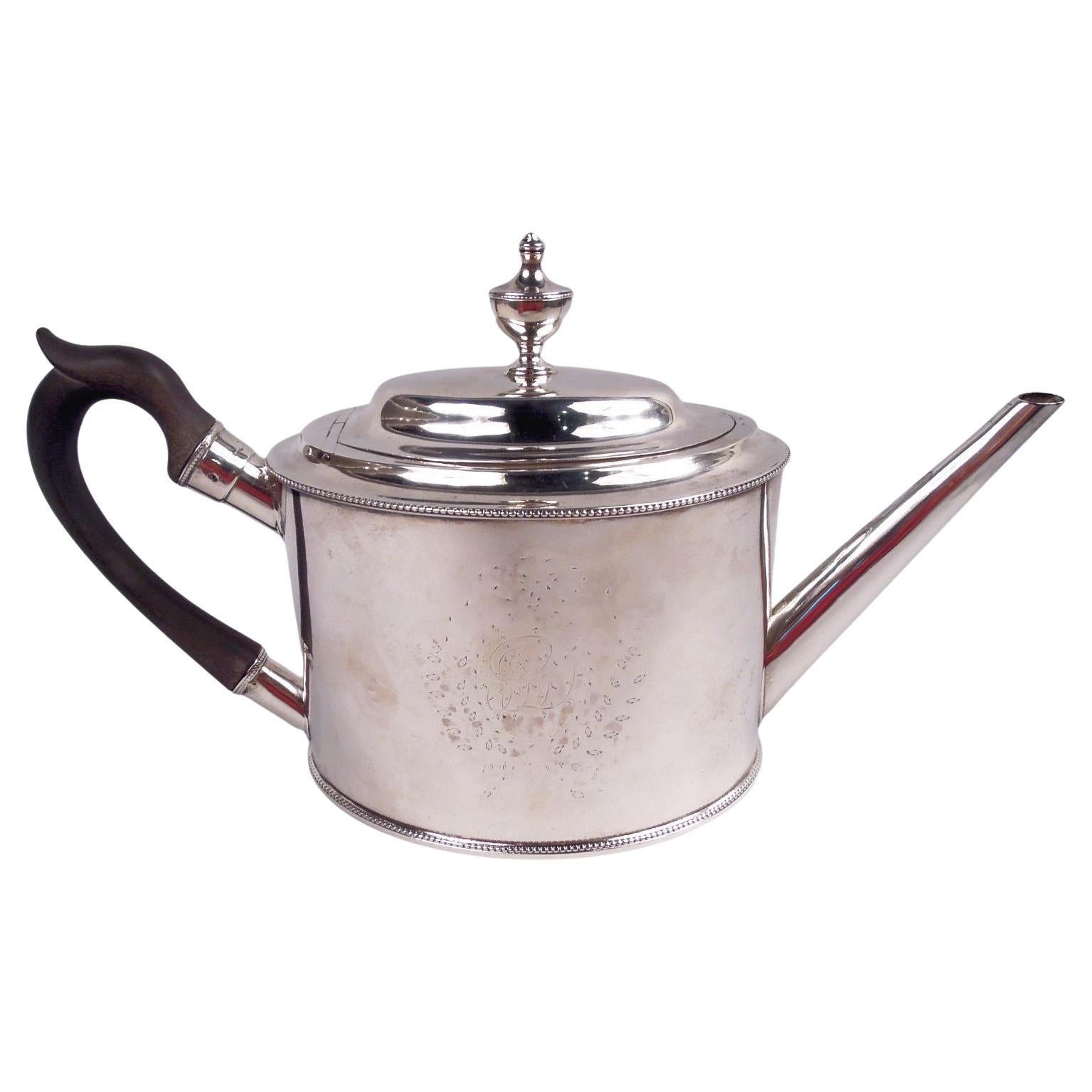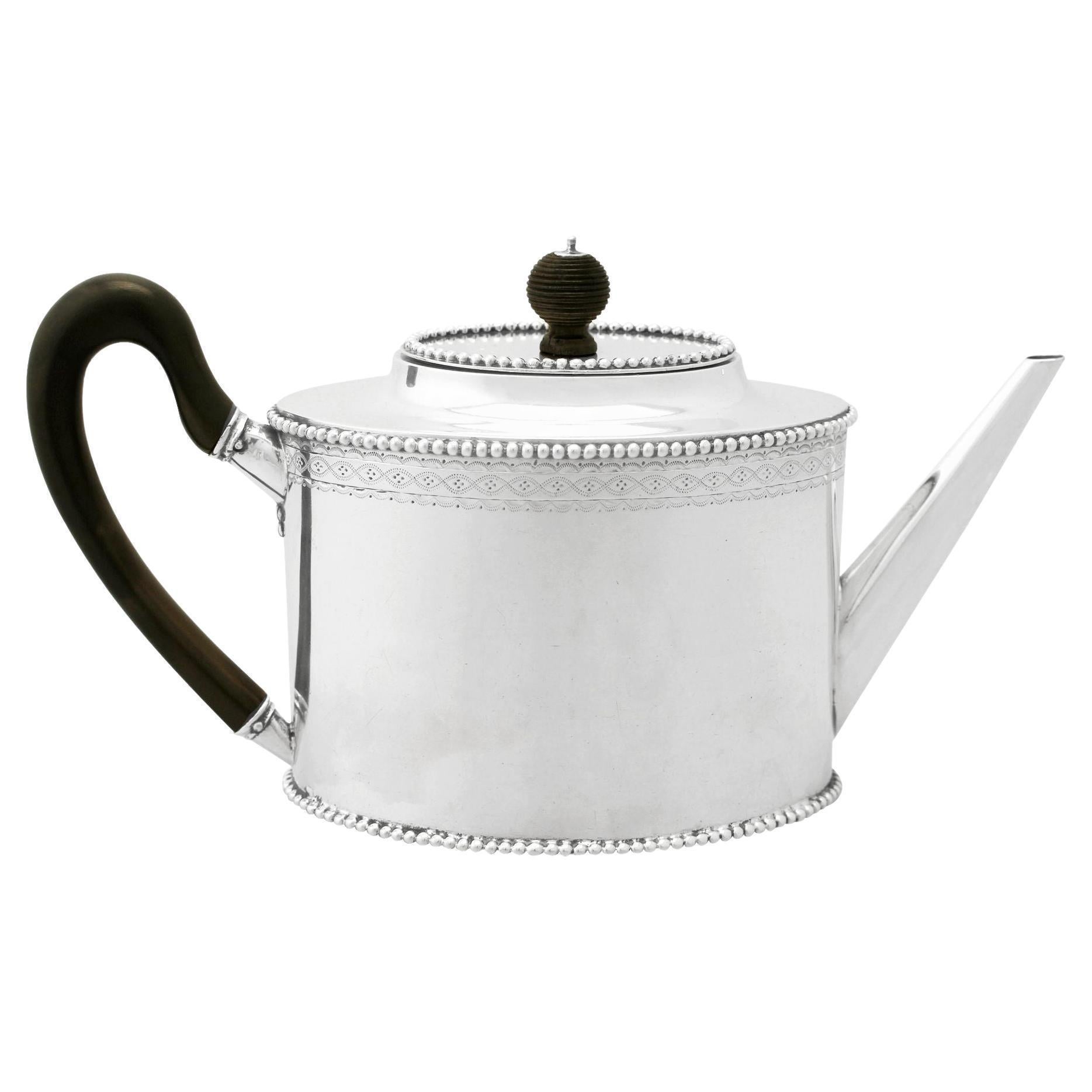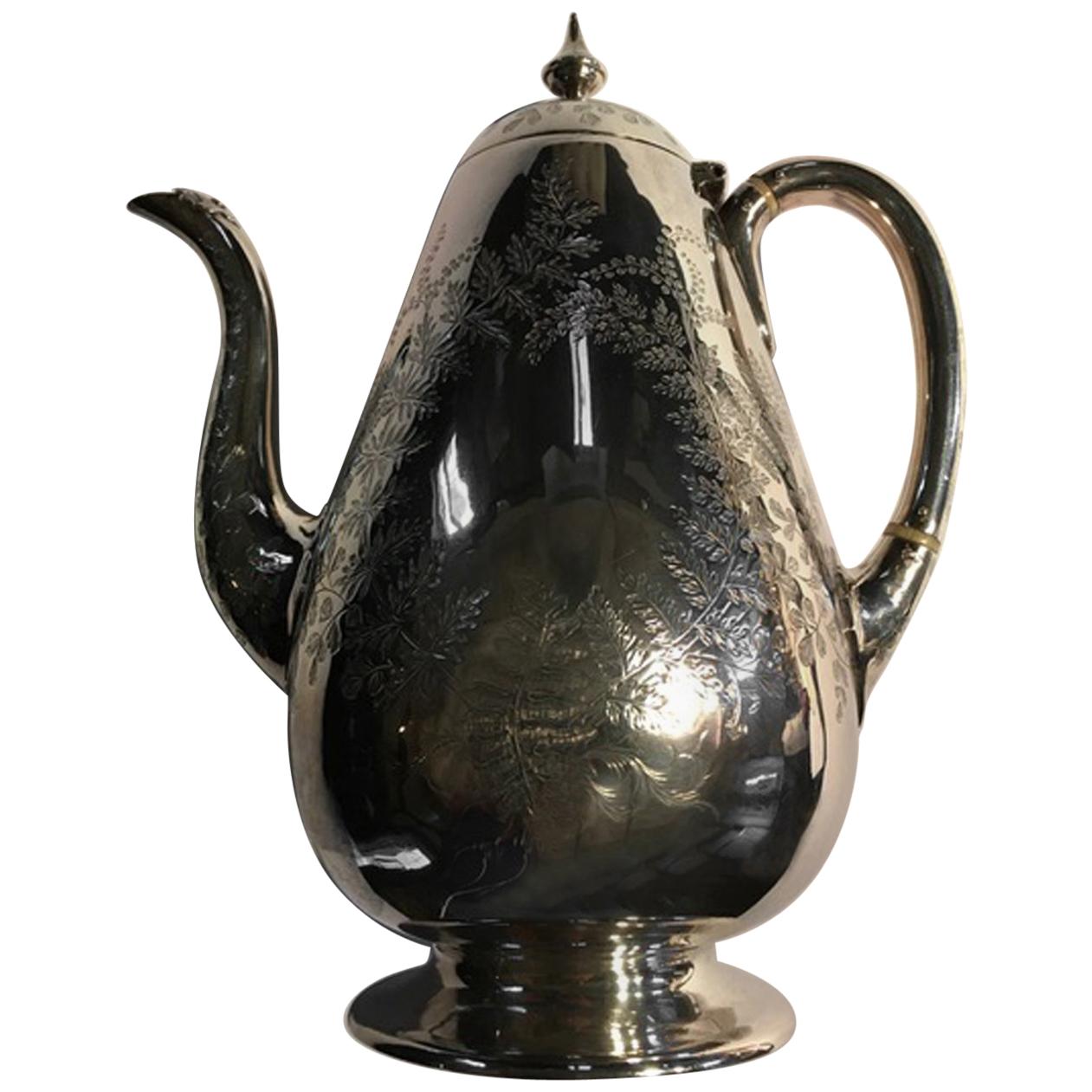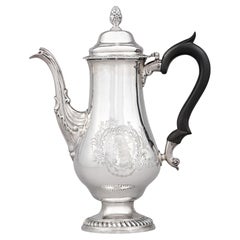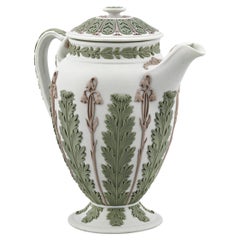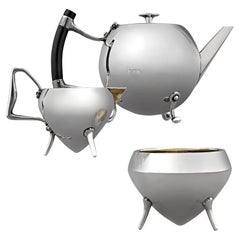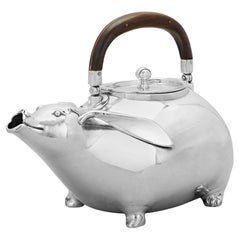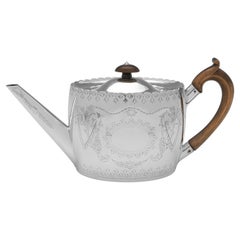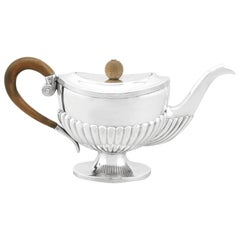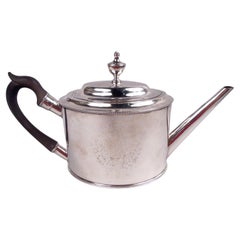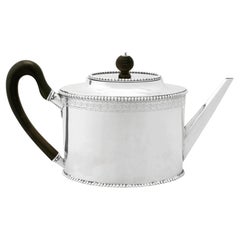Want more images or videos?
Request additional images or videos from the seller
1 of 7
Paul Revere Teapot
$225,000
£171,243.03
€196,120.37
CA$320,026.28
A$350,703.08
CHF 183,144.44
MX$4,214,492.10
NOK 2,289,623.96
SEK 2,159,480.25
DKK 1,463,819.85
About the Item
Neoclassical Silver Teapot
Paul Revere
Created 1791
This exceptional silver teapot is the work of Paul Revere, the legendary patriot and silversmith. A masterpiece of neoclassical design, it features elegantly shaped panels and bold fluted details—an innovative departure from tradition that showcases Revere’s ingenuity. One of the few surviving examples of its kind, this teapot represents both artistic and historical significance, making it a collector’s treasure.
Commissioned in 1791 by Hannah Speakman Rowe, a loyal patron of Revere’s workshop, this teapot was part of a larger silver service that reflected the latest in neoclassical refinement. Rowe, the wife of a prominent Boston merchant, purchased it along with a matching sugar dish on January 20, 1791. Later that year, she commissioned a substantial tea urn, now housed in the Metropolitan Museum of Art. All three pieces were engraved with her initials, “HR.”
Revere’s daybooks document this commission, illustrating a pivotal shift in his silver production. Prior to the American Revolution, he crafted just nine round teapots, but in the late 18th century, he embraced a fluted, neoclassical style. According to scholar Deborah A. Federhen, this evolution was influenced by both the rising affluence of his clientele and a groundbreaking advancement in his workshop: his acquisition of a flatting mill in 1785. This innovation allowed him to craft teapots from sheet silver shaped around wooden patterns, rather than painstakingly raising them from ingots—resulting in a refined aesthetic that exemplified elegance.
Born in 1734 to a Huguenot silversmith, Paul Revere's patriotism and his contribution to the American decorative arts are of inestimable value. He was immortalized in Henry Wadsworth Longfellow's poem, The Midnight Ride of Paul Revere, which tells of how he heroically rode through the countryside warning of the approaching British troops at the beginning of the American Revolution. This legendary event, along with his extraordinary work as a silversmith, has ensured a timeless legacy for Revere. In 1768, on the eve of the American Revolution, Revere crafted the “Sons of Liberty Bowl,” now housed at the Museum of Fine Arts, Boston. Both before and after serving his country during the Revolution, Revere was at the forefront of American silver, producing elegant bowls, sauceboats and teapots such as this very fine example.
7“ high x 11” wide x 3 5/8“ deep
Literature:
Beth Carver Wees, Early American Silver in the Metropolitan Museum of Art, 2013, p. 232
Exhibited:
Boston, Museum of Fine Arts, loaned 1941, 1942, 1967, 1970
Richmond, Virginia Museum of Fine Arts, 1980s–2014
Provenance:
Mrs. Hannah Rowe (1725-1805), to her great niece
Hannah Rowe Linzee Amory (1775-1845)
Francis S. Parker, Cambridge, Massachusetts (by descent)
Private Collection, United States
M.S. Rau, New Orleans
- Creator:Paul Revere (Metalworker)
- Dimensions:Height: 7 in (17.78 cm)Width: 11 in (27.94 cm)Depth: 3.63 in (9.23 cm)
- Style:Neoclassical (In the Style Of)
- Materials and Techniques:
- Place of Origin:
- Period:
- Date of Manufacture:1791
- Condition:
- Seller Location:New Orleans, LA
- Reference Number:Seller: 32-07491stDibs: LU891144043502
About the Seller
5.0
Recognized Seller
These prestigious sellers are industry leaders and represent the highest echelon for item quality and design.
Established in 1912
1stDibs seller since 2010
112 sales on 1stDibs
Typical response time: 10 hours
- ShippingRetrieving quote...Shipping from: New Orleans, LA
- Return Policy
Authenticity Guarantee
In the unlikely event there’s an issue with an item’s authenticity, contact us within 1 year for a full refund. DetailsMoney-Back Guarantee
If your item is not as described, is damaged in transit, or does not arrive, contact us within 7 days for a full refund. Details24-Hour Cancellation
You have a 24-hour grace period in which to reconsider your purchase, with no questions asked.Vetted Professional Sellers
Our world-class sellers must adhere to strict standards for service and quality, maintaining the integrity of our listings.Price-Match Guarantee
If you find that a seller listed the same item for a lower price elsewhere, we’ll match it.Trusted Global Delivery
Our best-in-class carrier network provides specialized shipping options worldwide, including custom delivery.More From This Seller
View AllPaul Revere Coffee Pot
By Paul Revere
Located in New Orleans, LA
Sterling Silver Coffee Pot
Paul Revere
Circa 1775
This phenomenal and incredibly rare silver coffee pot by the legendary patriot Paul Revere is one of only six armorial coffee pots crafted before the Revolutionary War, and one of only three still in private hands. The other two are housed in the collections of the Worcester Art Museum and the Museum of Fine Arts, Boston, making this coffee pot an extraordinary treasure. In terms of maker, quality and provenance, this coffee pot is the most significant American silver object available today.
The coffee pot bears the hallmarks of Revere's exquisite craftsmanship at every turn. Revere was not only the preeminent silversmith in America—he was the only silversmith in the colonies capable of crafting a finished product from the silver ingot to a finished engraved treasure, all by himself. Perfectly balanced and adorned with such fine Rococo detailing as a fluted scroll spout rising from a shell and a flower spray cartouche, this coffee pot epitomizes Revere's unmatched talent.
The pot also notably features Revere’s stamped maker’s mark and the original scratch weight of 40.1 troy ounces on the bottom of the pot. The average silver object made by the famed American would have weighed approximately five troy ounces, and his grand serving spoons averaged approximately two ounces each—making this coffee pot one of Revere's most magnificent and monumental masterpieces.
Within the central cartouche, the monogram "MSS" appears, belonging to the prominent Dr. Micajah Sawyer (1737-1815). A distinguished Harvard graduate, Sawyer was well-known as the "celebrated physician of Newburyport." Such an extraordinary object would have been a precious family heirloom, and this coffee pot remained in the Sawyer family until 1980, when it was sold to another American private collection, where it has remained until now. It was also prominently displayed at the Virginia Museum of Fine Arts for more than 30 years, from the 1980s until 2014.
Born in 1734 to a Huguenot silversmith, Paul Revere's patriotism and his contribution to the American decorative arts are of inestimable value. He was immortalized in Henry Wadsworth Longfellow's poem, The Midnight Ride of Paul Revere, which tells of how he heroically rode through the countryside warning of the approaching British troops at the beginning of the American Revolution. This legendary event, along with his extraordinary work as a silversmith, has ensured a timeless legacy for Revere.
In 1768, on the eve of the American Revolution, Revere crafted the “Sons of Liberty Bowl,” now housed at the Museum of Fine Arts in Boston. Both before and after serving his country during the Revolution, Revere was at the forefront of American silver, producing elegant bowls, sauceboats and creamers. By far, his most important works are coffee pots, of which only 15 are listed in his records books, making this coffee pot the ultimate piece of Revere's legacy.
Maker's mark "Revere" stamped near the top of the handle
12 1/4" high x 10" wide x 5" deep
42 ounces
Provenance:
Micajah and Sibyl Sawyer, Newburyport
Descended in the family until sold
Sotheby Parke Bernet, New York, April 30—May 3, 1980, lot 184
Private Collection, United States
M.S. Rau, New Orleans
Literature:
Patricia E. Kane, Colonial Massachusetts...
Category
Antique 18th Century American Sterling Silver
Materials
Sterling Silver
$1,285,000
Wedgwood Tri-Color Teapot
By Wedgwood
Located in New Orleans, LA
This charming Wedgwood teapot is crafted of tri-color jasperware, one of the firm’s rarest creations. The teapot’s classic form displays beautifully ap...
Category
Antique 19th Century Victorian Ceramics
Materials
Ceramic
Christopher Dresser Silverplate Tea Set
By Christopher Dresser
Located in New Orleans, LA
This silverplate tea set, striking in its simplicity, is the work of celebrated designer Christopher Dresser. Dresser first displayed his designs a...
Category
Antique 19th Century English Modern Tea Sets
Materials
Silver Plate
$34,500 / set
Christofle Animal Teapot
By Christofle, Emile Reiber
Located in New Orleans, LA
Beautifully crafted and endlessly charming, this exceptionally rare silverplate teapot by the prestigious firm of Christofle & Cie. takes the form of a stylized wild hare. It was designed by Emile Reiber, a highly regarded architect, designer and Prix de Rome winner who joined Christofle as head of the workshop of composition and drawing in 1865. The design is after a Meiji-period Japanese bronze from the famed collection of Henri Cernuschi, an Italian banker and savvy collector of the arts of the Far East.
Japonism was rising quickly in popularity in France around the time this teapot was created. Japan had opened borders and started trade with Europe in the 1860s, inspiring new ideas among European designers and artists like Reiber as they saw the arts of Japan firsthand for the first time. Cernuschi exhibited his collection at the Palais de l'Industrie at the Orientalist Exhibition in 1873-74, where Reiber spent weeks sketching the bronze artifacts — drawings he then translated into luxurious silverplate objects for Christofle.
Based in Paris, Christofle & Cie. has been manufacturing high-quality luxury items since 1830. Christofle silver has graced the tables of European and Asian nobility for decades, and it is the tableware of choice on such luxury transportation as the Orient Express and the Trans-Siberian Railway. Innovative and revolutionary, the Christofle name is synonymous with elegance and style.
An identical Christofle teapot...
Category
Antique 19th Century French Meiji Sheffield and Silverplate
Materials
Silver Plate
$29,850
Tiffany & Co. Silver And Cut Glass Pitcher
By Tiffany & Co.
Located in New Orleans, LA
This exceptional Tiffany & Co. American Brilliant cut glass pitcher epitomizes the refined luxury for which the firm is renowned. ...
Category
20th Century American Other Pitchers
Materials
Silver
Chinese Export Silver Tea and Coffee Service
By Yu Chang
Located in New Orleans, LA
This stunning and complete seven-piece Chinese export silver tea and coffee service was crafted by Yu Chang of Shanghai and Hong Kong, a firm re...
Category
Antique Late 19th Century Chinese Chinese Export Tea Sets
Materials
Sterling Silver
You May Also Like
Attractive Engraved Victorian Antique Sterling Silver Teapot, London, 1881
By Henry William Curry
Located in London, London
Hallmarked in London in 1881 by Henry William Curry, this attractive, Victorian, Antique sterling silver teapot, features engraved detailing throughout, a wooden handle and finial, a...
Category
Antique 1880s English Victorian Sterling Silver
Materials
Sterling Silver
Antique 1800s Dutch Silver Teapot
Located in Jesmond, Newcastle Upon Tyne
A fine and impressive antique Dutch 833 standard silver teapot; an addition to our silver teaware collection
This exceptional antique Dutch silver teapot...
Category
Antique 1820s Dutch Serving Pieces
Materials
Silver, Sterling Silver
Antique John Burger New York Federal Classical Silver Teapot
Located in New York, NY
Federal Classical coin silver teapot. Made by John Burger in New York, ca 1790. Straight and oval with long diagonal spout; silver-mounted high-looping and leaf-capped stained-wood h...
Category
Antique Late 18th Century American Federal Tea Sets
Materials
Silver
19th Century Dutch Silver Teapot
Located in Jesmond, Newcastle Upon Tyne
An exceptional, fine and impressive antique Dutch silver teapot, an addition to our silver teaware collection.
This exceptional antique Dutch si...
Category
Antique Early 1800s Dutch Tableware
Materials
Silver
London 18th Century Sterling Silver Teapot
Located in Brescia, IT
18th Century sterling silver natural ferns branches decor teapot, London
This magnificent teapot is finely hand-engraved with detailed natural ferns and branches. These fine engravi...
Category
Antique 18th Century English Victorian Tableware
Materials
Sterling Silver
Roberts & Belk Ltd 1930s Sterling Silver Teapot
By Roberts & Belk Ltd. 1
Located in Jesmond, Newcastle Upon Tyne
An exceptional, fine and impressive antique George V English sterling silver teapot made by Roberts & Belk Ltd; an addition to our silver teaware collection.
This exceptional antique George V sterling silver teapot has a plain paneled rounded form onto a spreading octagonal base.
The paneled surface of the teapot is plain and unembellished, with swept shoulders an applied moulded border to the upper rim.
This Roberts and Belk silver...
Category
Vintage 1930s British Sterling Silver
Materials
Silver, Sterling Silver
More Ways To Browse
Tea House
Richmond Virginia
Paul Revere Silver
Paul Revere Silversmith
Parker Antiques
Paul Revere Teapot
Rococo Teapot
Wedgwood Cup
Antique Chinese Silver Marks
Antique Copper Teapot
Milk Sugar Silver
Pewter Coffee Set
Pewter Teapot
Rorstrand Teapot
Teapot Warmer
1920 Teapot
800 Silver Tea Set
Christofle Art Deco Tea Set
